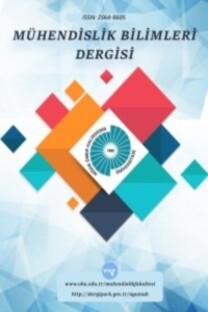BORLANMIŞ AISI 316 PASLANMAZ ÇELİĞİN AŞINMA DAVRANIŞININ İNCELENMESİ
Bu çalışmada borlanmış AISI 316 paslanmaz çeliğin aşınma davranışı incelenmiştir. Borlama işlemi öncesi, optik emisyon spektrometresi yardımıyla, deney numunesinin kimyasal analizi gerçekleştirilmiştir. Borlama deneyi, 950°C’de 3 saat süre ile kutu borlama yöntemi kullanılarak gerçekleştirilmiştir. Borlayıcı olarak, SiC, B4C and KBF4’ den oluşmuş, ticari adı Ekabor 2 olan toz karışımı kullanılmıştır. Borlama işlemi sonucunda, AISI 316 paslanmaz çeliğin yüzeyinde oluşan borür tabakasının morfolojisi, tarama elektron mikroskobu (SEM-geri saçılan elektronlar), kalınlığı optik mikroskoba entegreli görüntü analiz sistemi, sertliği Vickers batıcı uç ile ve kimyasal analizi XRD (X-ışını difraksiyonu) cihazı ile gerçekleştirilmiştir. Daha sonra, borür tabakasının aşınma direncini belirlemek için, sürtünme testi gerçekleştirilmiştir. Sonuç olarak, borlanmış AISI 316 paslanmaz çeliğin yüzeyinde oluşan demir-borür tabakasının çift fazlı olduğu belirlenmiştir. Bu tabaka, kolonsal yapılı ve homojen kalınlıktadır. Ayrıca, çok sert ve yüksek aşınma direncine sahip olduğu belirlenmiştir.
Anahtar Kelimeler:
AISI 316 paslanmaz çelik, kutu borlama, Ekabor 2, demir-borür tabakası, aşınma direnci
INVESTIGATION OF WEAR BEHAVIOR OF BORONIZED AISI 316 STAINLESS STEEL
In this study, the wear behavior of boronized AISI 316 stainless steel was investigated. The chemical analysis of the sample to be used in the experiment was carried out with optical emission spectrometry before starting the boronizing experiment. Boronizing experiment using pack-boronizing method were carried out at 950°C for 3 hours. As the boron source, a powder mixture having the commercial name Ekabor 2 consisting of SiC, B4C and KBF4, was used. As a result of the boronizing treatment, the boride layer formed on the surface of AISI 316, morphologically by Scanning Electron Microscope (SEM-BEI), thickness by optical microscope integrated visual analyze system, hardness by Vickers indenter and chemical analysis by XRD (X-ray diffraction) device, were investigated. Then, friction tests were carried out to determine the wear resistance of the boride layer. As a result, it is determined that the boron layer formed on the surface of boronized AISI 316 stainless steel, consists of a double phase iron-boride layer. This layer is a columnar morphology and homogeneous thickness. Also it has been determined to have ultra-hard and high wear resistance.
___
- [1] ADDAIR R., Understanding of The Elements of the Periodic Table – Boron (1st ed.), The Rosen Publishing Group, New York, USA, 2007
- [2] www.periodictable.com/Elements/005/index.html (date of access 10.10.2018)
- [3] www.chemistry.pomona.edu/chemistry/periodic_table/Elements/Boron/boron.htm (date of access October 2018)
- [4] www.etimaden.gov.tr/en/boron-minerals (date of access 10.10.2018)
- [5] https://depts.washington.edu/eooptic/linkfiles/The%20Elements.pdf (date of access 10.10.2018)
- [6] GISSLER W., JEHN H.A., Advanced Techniques for Surface Engineering (1st ed.), Springer Science and Business Media, Netherlands, 2013
- [7] MARAGOUDAKIS N. E., STERGIOUDIS G., OMAR H., PAVLIDOU E., TSIPAS D.N., “Boro-nitriding of Steel”, Materials Letters, 57, 949-953, 2002
- [8] SINHA AK., “Boriding (Boronizing)”, ASM Handbook, Vol.4: Heat Treating, (9th ed.), ASM International, Ohio, USA, 1991
- [9] DONG X., HU J., HUANG Z., WANG H., GAO R., GUO Z., “Microstructure and Properties of Boronizing Layer of Fe-based Powder Metallurgy Compacts Prepared by Boronizing and Sintering Simultaneously”, Science of Sintering, Vol.41, 199-207, 2009.
- [10] DOMÍNGUEZ M.O., FRENTERIA M. A., KEDDAM M., M. ESPINOSA E., MEJIA O. D.,GONZALEZ J. I. A., SİLVA J. Z., MORENO S. A. M., REYES J. G. G. “Simulation of Growth Kinetics of Fe2B Layers Formed on Gray Cast Iron During the Powder-pack Boriding” Materials and Technology, Vol. 48/6, 904-905, 2014
- [11] CARUTA B. M., Thin Films and Coatings: New Research, Nova Science Publishers Inc; UK ed.,2005
- [12] BÉJAR M. A., MORENO E., “Abrasive Wear Resistance of Boronized Carbon and Low-Alloy Steels”, Journal of Materials Processing Technology, Vol. 173, Issue 3, 352-358, 2006
- [13] https://www.mse.iastate.edu/research/laboratories/sem/microscopy/how-does-the-sem-work/ high-school/how-the-sem-works/backscattered-electrons (date of access October 2018)
- [14] ISWADI J., YUSOF H.A.M., ROZALI S., OGIYAMA H., “Effect of Particle Sizes on the Development of Ultra Hard Surface Through Superplastic Boronizing of Duplex Stainless Steel” Journal of Solid Mechanics and Materials Engineering. Vol.1, 539-546, 2007
- [15] USLU I., CÖMERT H., İPEK M., ÖZDEMIR O., BINDAL C., “Evaluation of Borides Formed on AISI P20 Steel” Materials and Design, Vol.28, 55-61, 2007
- [16] Yoon, J.H.; Jee, Y.K.;Lee, S.Y.: “Plasma Paste Boronizing Treatment Of The Stainless Steel AISI 304” Surface and Coatings Technology 112 (1999)71–75
- [17] KAYALI Y., BÜYÜKSAĞİŞ A., YALÇIN Y., “Corrosion and Wear Behaviors of Boronized AISI 316L Stainless Steel” Met. Mater. Int., Vol. 19, No. 5 (2013), pp. 1053~1061, doi: 10.1007/s12540-013-5019-x
- ISSN: 2564-6605
- Yayın Aralığı: Yılda 4 Sayı
- Başlangıç: 2017
- Yayıncı: Niğde Ömer Halisdemir Üniversitesi
Sayıdaki Diğer Makaleler
Ayla KORKMAZ, Fehmi NAİR, İsmail YILDIRIM, Hasan KAYA
KAPADOKYA BÖLGESİ’NİN YAZ AYLARI BUHARLAŞMA VERİLERİ İÇİN TREND ANALİZİ
PM10 VE SO2 KONSANTRASYONLARI VE METEOROLOJİK PARAMETRELERİN KONSANTRASYONLAR ÜZERİNE ETKİLERİ
Kubilay KARACİF, Hasan KARABULUT, Ramazan ÇITAK
BURSA, YENİŞEHİR SİNAN PAŞA KÜLLİYESİ İMARETİNİN SAYISAL MODELLENMESİ VE YAPISAL ANALİZİ
ÇEVRESEL SÜRDÜRÜLEBİLİRLİK VE KAPALI KONUT SİTESİ İLİŞKİSİNİN ISTANBUL, BEYKOZ’DA İNCELENMESİ
